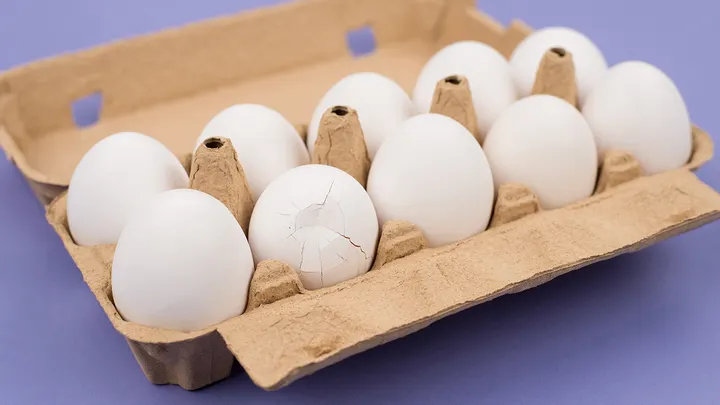Is a cracked egg ever safe to eat? What you must know.
Egg’s shell and membrane work to protect the inside from harmful bacteria
With the high price of eggs right now, it can be disheartening to open the carton at home and see that one or two of the eggs have cracked – either in transit on the way back from the grocery store, or from some unknown cause in the fridge.
Egg production in the U.S. dropped 4% in November as the price of eggs and cases of bird flu continue to rise across the country, according to a report from the U.S. Department of Agriculture (USDA), as FOX Business reported this week.
But what can be done with cracked eggs? Is all hope lost?
An egg expert shared some “eggspertise” on the subject.
“Basically, it comes down to when the egg cracked,” Lisa Steele, the author of “Fresh Eggs Daily” and a Maine-based backyard chickens expert, told Fox News Digital.
It is also important to check eggs for any cracks before purchasing.
The shell of an egg, along with the egg’s membrane, protect the egg from harmful bacteria, such as salmonella.
During wintertime, eggs from backyard chicken coops are more susceptible to cracking due to the cold temperatures.
“But if you know that you just cracked the egg by accident, then I would cook that one up and call it good,” she said.
During wintertime, eggs from backyard chicken coops are more susceptible to cracking due to the cold temperatures, Steele told Fox News Digital.
For Steele personally, she said she would use an egg that she recently accidentally cracked — but only if it still had an intact membrane.
“That membrane protects [the egg] from bacteria,” she said.
“You can just crack the egg into a small bowl, cover it with plastic wrap or a lid, and use it within two days – making sure you cook it fully to at least 160 degrees.”
But if the membrane is broken, it is not safe for humans to eat, said Steele.
It is, however, still good for the compost bin.
“The calcium in the shell is great for the soil,” she said.
The Department of Agriculture shared similar guidance on its website.
“Bacteria can enter eggs through cracks in the shell. Never purchase cracked eggs,” said the USDA.
Eggs that crack during the cooking process, such as hard-boiling, “are safe,” noted the USDA.
These cracked eggs do not need to be thrown away.
Also, “remember that all eggs should be thoroughly cooked,” said the same source.
While eggs haven’t historically been considered a “health food,” the FDA now classifies them as a “healthy, nutrient-dense” food, according to a new proposed rule.
The update is the result of changes in nutrition science and dietary recommendations, according to the agency.
Melissa Rudy and Greg Wehner, both of Fox News Digital, contributed reporting.



0 Comments